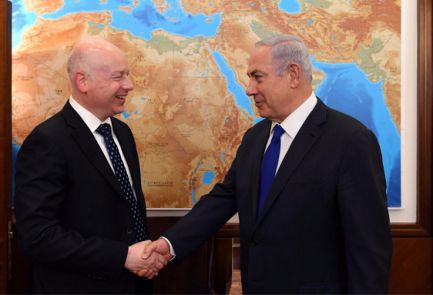In first official remark on last week’s reconciliation agreement between rival Palestinian factions Fatah and Hamas, U.S. envoy Jason Greenblatt says that if Hamas wants to play a role in the Palestinian government, it must heed U.S., Israeli demands.
U.S. special envoy to the Middle East Jason Greenblatt and Prime Minister Benjamin Netanyahu, in Jerusalem | Photo: GPO
A week after rival Palestinian factions Hamas and Fatah signed a reconciliation agreement, U.S. President Donald Trump’s special envoy to the Middle East said Thursday that if Hamas wants to play a role in any Palestinian government, it must renounce violence and commit to peaceful negotiations with Israel.
Jason Greenblatt’s statement Thursday was the first American comment on the advancing Palestinian reconciliation efforts and echoed Israeli demands.
“Any Palestinian government must unambiguously and explicitly commit to nonviolence, recognize the State of Israel, accept previous agreements and obligations between the parties – including to disarm terrorists – and commit to peaceful negotiations,” Greenblatt said in a statement.
“If Hamas is to play any role in a Palestinian government, it must accept these basic requirements,” he added. Hamas has always refused similar demands in the past.
Cabinet minister Naftali Bennett (Habayit Hayehudi) welcomed Greenblatt’s statement Thursday, saying, “I commend the American envoy on his clear message – that the Palestinian government must disarm terrorist organizations and recognize Israel. I want to stress our government’s position: The State of Israel will not negotiate with a Palestinian government that rests on a terrorist organization until Hamas disarms, recognizes Israel and returns the captive civilians and bodies of fallen IDF soldiers.”
Under Egyptian auspices, the Palestinian factions last week announced a preliminary agreement and have formed committees to sort out unresolved issues, most notably who will control Hamas’ massive weapons arsenal.
While agreeing to turn over all governing responsibilities to Fatah, Hamas has said control of its weapons was not up for negotiation. That would leave Hamas with significant behind-the-scenes influence over Palestinian affairs, even if it does not have an official role in the next government.
On Tuesday, Israel said it would not conduct diplomatic negotiations with a Palestinian government that included the terrorist group Hamas. Prime Minister Benjamin Netanyahu’s office said there would be no talks with the Palestinians unless Hamas agreed to the same conditions put forth by Greenblatt – conditions it is unlikely to accept.
Hamas seized control of the Gaza Strip from Abbas’ forces in a military coup in 2007, leaving the Palestinians divided between two governments. Previous reconciliation attempts have failed, and there is no guarantee that the current round of talks will succeed.
Netanyahu’s and Greenblatt’s stance matched past demands placed on Hamas by Israel and the international community – that it renounce violence and recognize Israel’s right to exist.
But on Tuesday, Israel added new conditions, including that Abbas’ government continue to crack down on Hamas terrorists in the West Bank, that Hamas sever ties with Iran, and that it returns the remains of two Israeli soldiers and two living Israeli civilians held captive by the terrorist group in Gaza.
Abbas spokesman Nabil Abu Rudeineh said reconciliation is a top Palestinian interest. “Any Israeli remarks will not change the official Palestinian position to move forward with the reconciliation efforts to achieve the hopes and aspirations of our people in ending the division,” he said in a statement Tuesday night.
Hamas spokesman Fawzi Barhoum said, “This is an unacceptable Israeli interference in Palestinian internal affairs.”




Leave a Reply
You must be logged in to post a comment.